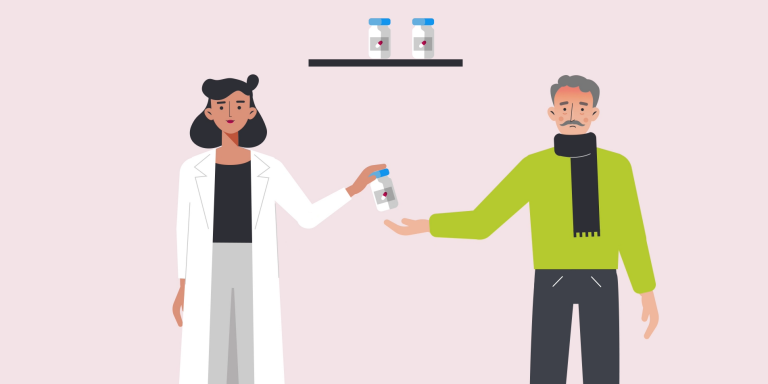
Antibiotics against coughs with mucus?
Antibiotics are one way to treat acute bronchitis. But is using them the best approach? We provide the information so you can make up your mind.
A persistent cough, also known as acute bronchitis, is due to inflammation of the lower respiratory tract. In addition to a cough, patients also often have other cold-like symptoms such as fever. These symptoms usually last for two weeks, while the cough can continue for up to eight weeks.
The Harding Center for Risk Literacy at the Faculty of Health Sciences Brandenburg and the University of Potsdam summarised existing scientific studies on the potential risks and benefits of prescribing antibiotics for acute bronchitis:
The medical evidence
Out of 100 people who took antibiotics for two weeks, 37 people had a cough with mucus at the follow-up consultation. Out of 100 people who took a placebo or no medicine at all, just as many patients had a cough with sputum.
The same number of patients in both groups reported that their state of health had improved after two weeks.
Patients who took antibiotics felt ill for an average of five days. Patients who did not take antibiotics were sick for about five-and-a-half days, so half a day longer.
From patients who took antibiotics, 23 out of 100 suffered nausea, vomiting or diarrhoea. The number of patients suffering the same symptoms who did not take antibiotics was 19 out of 100.
In other words, the two groups derived nearly the same benefit. Why is this?
Why don’t antibiotics always help?
In most cases, acute bronchitis is caused by a virus. Antibiotics do not help here. They only work against bacterial infections. Furthermore, people who take antibiotics experience nausea, vomiting or diarrhoea more frequently compared to people who take a placebo.
When should you see a doctor?
If your general state of health deteriorates, you should see a doctor. This is necessary in order to rule out pneumonia, for example.
Threat of antibiotic resistance
There is another reason for carefully considering whether it makes sense to take antibiotics: overusing them causes the structure of bacteria to change. The result is: one of the most important drugs for treating infectious diseases suddenly stops working.
Conclusion
Ultimately, everyone has to decide for themselves whether or not taking antibiotics for coughs with mucus makes sense given these facts. We hope you now have a clearer overview of this complex issue.


Newsletter
Find out more about current health issues every month and get all the information you need about our attractive offers from all Helsana Group companies * delivered by e-mail to read whenever it suits you. Our newsletter is free of charge and you can sign up here:
We did not receive your information. Please try again later.
* The Helsana Group comprises Helsana Insurance Company Ltd, Helsana Supplementary Insurances Ltd and Helsana Accidents Ltd.